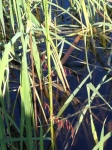Introduction
“Boozhoo Manoomin” is a nine-part suite written by Beverley McKiver for voice, flute, piano and cello or viola. It musically explores manoomin (wild rice), the sacred food of the Anishinabeg (The People). “Boozhoo” is a greeting in Anishinabemowin (Ojibway language). This suite of pieces acknowledges the importance of the manoomin harvest to the Anishinabeg and how their destiny is historically and spiritually linked to that knowledge. The manoomin harvest is under threat today as a result of human industrial and recreational activities. The sustainability of manoomin is indicative of the state of our planet’s health and well-being and should be seen as the responsibility of all of us.
About the Composer

I was born in Kenora, Ontario. My mother was from Obishikokaang (Frenchman’s Head) on Lac Seul First Nation. I was adopted at age four and raised in Dryden in Northwestern Ontario. I took piano lessons to Grade 10 Royal Conservatory of Music. I’ve been a lifelong part-time musician, playing for church services, directing choir, accompanying and taking jazz piano lessons. In 2014, I left my 30-year career in information technology and became a piano teacher and student at the University of Ottawa in Piano Pedagogy. Boozhoo Manoomin is my first suite of compositions.
Background
I have had a life-long fascination with manoomin (wild rice). It was often served as a favourite casserole dish at parties in Northwestern Ontario in my childhood. Later on, I was fascinated by this plant and read everything I could find about it and was elated when someone showed it to me growing in the wild. A few years ago, I had a chance to learn about the steps involved in processing manoomin when my daughter was gifted with some that needed to be roasted, danced and winnowed. I was honoured to experience this traditional activity. I delight in visiting the manoomin that grows in a lake near my home. As I gradually came to understand the relationship between my ancestors and manoomin, I felt compelled to musically explore that rich legacy.
My work is inspired by the Seven Fires Prophesies which outline the migration of the Anishinabeg from the eastern seaboard to the areas around the Great Lakes where manoomin is found and the eras and trials that successive generations would undergo. It is also influenced by the Seven Grandfather Teachings which set out the personal attributes required to live a good life. Boozhoo Manoomin also pays tribute to manoomin’s place in the ecosystem and steps of the manoomin harvest.
What is manoomin?
 Manoomin is the Anishinaabe word for an aquatic grass that grows around the Great Lakes. It is highly nutritious and was traditionally harvested by the Anishinaabeg
Manoomin is the Anishinaabe word for an aquatic grass that grows around the Great Lakes. It is highly nutritious and was traditionally harvested by the Anishinaabeg
Manoomin: The Sacred Food is a short documentary about the oral history of manoomin and the threat of genetically modified commercial wild rice.
Here are some Ojibway words related to the manoomin harvest:
Listen to Ryan McMahon’s interview with Anishinaabe manoomin harvester James Whetung about why manoomin is so important to the Anishinaabeg and how it is at the heart of a conflict between First Nations harvesters and cottagers near Peterborough, Ontario.
Red Man Laughing – The Wild Rice Wars (S.6 EP7)
What are the Seven Grandfather Teachings?
The Seven Grandfather Teachings
To cherish knowledge is to know WISDOM.
To know LOVE is to know peace.
To honour all of the Creation is to have RESPECT.
BRAVERY is to face the foe with integrity.
HONESTY in facing a situation is to be brave.
HUMILITY is to know yourself as a sacred part of the Creation.
TRUTH is to know all of these things.
from The Mishomis Book – The Voice of the Ojibway by Edward Benton-Banai
Our Seven Ojibway Teachings – Elder Dave Courchene
https://www.youtube.com/watch?v=sASjfNI_lD0
What are the Seven Fires Prophesies?
Seven Fires Prophecy read by Grandfather William Commanda https://www.youtube.com/watch?v=hEMS7n-tmrM
Composer Goals
- To create awareness and understanding about manoomin
- To think about contemporary applications of the Seven Grandfather Teachings and Seven Fire Prophecies of the Anishinaabeg
- Here’s a paper I wrote about my work: Boozhoo Manoomin – Beverley McKiver – Term Paper MUS4104
Composition Concepts
- Suite of pieces portraying manoomin history and harvesting
- Originally conceived for jazz or rock combo
- Revised for classical chamber ensemble (flute, piano, cello/viola, voice)
- Nine pieces
History of Work
- 2015 – sketches for Boozhoo Manoomin
- Summer 2015, 2016, 2017 – Jazz Works Composers’ Symposium
- August 2017 – completion of suite
- Performances
- September 2017 – opening for Water is Life (But Many Can’t Drink It) – Winona LaDuke at University of Toronto
- June 2018 recording – Beverley McKiver (piano), Anne Cure (cello), Zoé Dumas (flute), Larissa Desrosiers (vocals)
- June 2018 – Vancouver Jazz Festival (Indigenous Residency), excerpts in collaboration with Jessica McMann (flute) and Karen Donaldson Shepherd, (viola and voice)
- November 2018 – Weesageechak Begins to Dance developmental festival – Toronto. Thanks to Native Earth Performing Arts for their support of script development.
Themes
Compositional
- Anishinabeg oral history
- Mino bimaadziwin (healthy living)
- Elements (water, air, fire, earth)
- Sacred Creation
Personal
- Identity
- Recovering traditional knowledge
- Ecology
- Past, Present, Future

